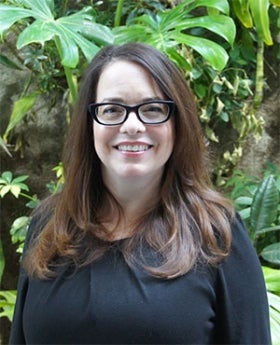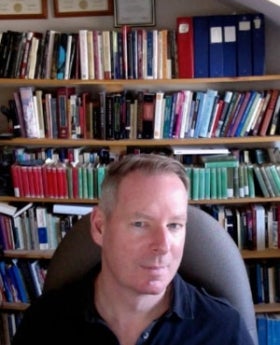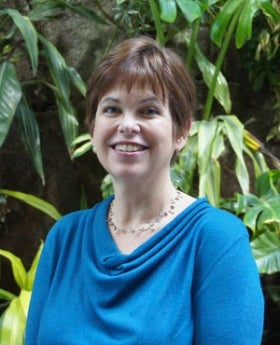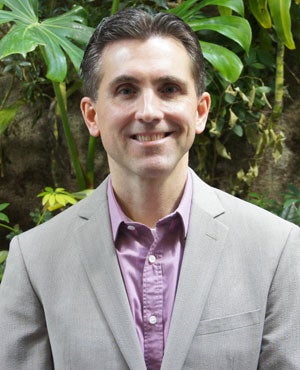University of Waterloo's distinguished teachers
Four professors are honoured for their innovative teaching approaches and connection to students
Four professors are honoured for their innovative teaching approaches and connection to students
By Staff Centre for Teaching ExcellenceThe Distinguished Teacher Award (DTA), Waterloo’s most prestigious teaching honour has been given to four recipients “in recognition of a continued record of excellence in teaching at the University of Waterloo.”
The recipients are chosen by a committee of students, faculty, staff and alumni based on nominations from the university community. The 2015 award winners are:
 Greta Kroeker, an associate professor in the Department of History, joined the University of Waterloo in July 2007. Kroeker goes beyond what is expected of an instructor by creating a “learning environment all its own,” as one alumnus describes it. Teaching courses that require students to complete readings can be difficult. She uses her own enthusiasm, humour, and deep understanding of the content to encourage students.
Greta Kroeker, an associate professor in the Department of History, joined the University of Waterloo in July 2007. Kroeker goes beyond what is expected of an instructor by creating a “learning environment all its own,” as one alumnus describes it. Teaching courses that require students to complete readings can be difficult. She uses her own enthusiasm, humour, and deep understanding of the content to encourage students.
As one graduate student said, “Dr. Kroeker encouraged me to continue to pursue my studies in history, thereby greatly impacting and influencing my own learning.” By acting as a mentor and a motivator, Kroeker allows students to “feel safe and secure in their learning environment," and dedicates many hours to supporting them. By structuring tutorials and assigning group projects that encourage creativity, students are able to develop “‘out of the box’ thinking when presenting research information.” As her fellow colleague explains, “Dr. Kroeker personally builds a compelling case for higher education, linking practical skills with intellectual achievement.”
 Michael MacDonald, an associate professor in the Department of English Language and Literature joined the University of Waterloo in 2001. MacDonald surpasses student expectations as a result of his remarkable ability to communicate content seamlessly." He ensures students have an understanding of what is expected, and structures his courses so that students are able to remain focused and on-track. MacDonald does more than just ensure that his students complete academic requirements. He encourages students to “develop new ways of thinking about language and rhetoric,” which is one way a former graduate felt inspired by MacDonald’s teaching. Outside of the classroom, MacDonald is dedicated to remaining connected and fostering constant interaction with his students. He responds “promptly to students queries on the LEARN discussion boards” and “makes himself available to students” if they ever have questions. MacDonald makes time to explain concepts further, which has a positive impact on student learning. “His easy-going but professional demeanor ensured that he commanded respect from the class, while also creating a non-intimidating atmosphere that made the classroom feel like a safe place to speak and promote ideas,” said one undergraduate.
Michael MacDonald, an associate professor in the Department of English Language and Literature joined the University of Waterloo in 2001. MacDonald surpasses student expectations as a result of his remarkable ability to communicate content seamlessly." He ensures students have an understanding of what is expected, and structures his courses so that students are able to remain focused and on-track. MacDonald does more than just ensure that his students complete academic requirements. He encourages students to “develop new ways of thinking about language and rhetoric,” which is one way a former graduate felt inspired by MacDonald’s teaching. Outside of the classroom, MacDonald is dedicated to remaining connected and fostering constant interaction with his students. He responds “promptly to students queries on the LEARN discussion boards” and “makes himself available to students” if they ever have questions. MacDonald makes time to explain concepts further, which has a positive impact on student learning. “His easy-going but professional demeanor ensured that he commanded respect from the class, while also creating a non-intimidating atmosphere that made the classroom feel like a safe place to speak and promote ideas,” said one undergraduate.
 Mary Louise McAllister, an associate professor in Environment and Resources Studies and Teaching Fellow for the Faculty of Environment joined the University of Waterloo in September 1996. McAllister transcends the expectations of an educator, dedicating innumerable hours to improving the student learning experience. Her compassion and “contagious enthusiasm” creates an encouraging classroom atmosphere that is conducive to student learning and engagement. McAllister is always searching for innovative, experiential learning techniques and frequently employs alternative teaching methods to maximize student understanding. As one of her undergraduate students states, McAllister is “always willing to change the curriculum to best suit the needs of a specific class, providing personalized environments that create unmatched learning experiences.” A mentor in her field, McAllister continues to share her wealth of knowledge and passion for teaching within her peer group. Her GreenTEA blog is one of the many outlets in which McAllister explores new teaching technologies and promotes deeper pedagogical reflection. One former student said, McAllister is “influencing the next generation of environmental leaders”.
Mary Louise McAllister, an associate professor in Environment and Resources Studies and Teaching Fellow for the Faculty of Environment joined the University of Waterloo in September 1996. McAllister transcends the expectations of an educator, dedicating innumerable hours to improving the student learning experience. Her compassion and “contagious enthusiasm” creates an encouraging classroom atmosphere that is conducive to student learning and engagement. McAllister is always searching for innovative, experiential learning techniques and frequently employs alternative teaching methods to maximize student understanding. As one of her undergraduate students states, McAllister is “always willing to change the curriculum to best suit the needs of a specific class, providing personalized environments that create unmatched learning experiences.” A mentor in her field, McAllister continues to share her wealth of knowledge and passion for teaching within her peer group. Her GreenTEA blog is one of the many outlets in which McAllister explores new teaching technologies and promotes deeper pedagogical reflection. One former student said, McAllister is “influencing the next generation of environmental leaders”.
 Jeff West is a Professional Engineer, Fellow of American Concrete Institute, associate professor and associate chair for undergraduate studies in Civil and Environmental Engineering. Since joining the University of Waterloo in January 2008, West has supervised a dozen Master’s students, as well as supervised six PhD students. West is recognized as one of the top instructors in his department by excelling in leadership, course design, and curriculum renewal. Student teaching evaluations have always been outstanding, conveying students’ appreciation for his effective teaching methods and learning environment. As one of his students notes, “His unique delivery method and organized presentation made each and every lecture a sheer joy to attend.” West is widely known for his ability to convey material to the class in a clear and concise manner by infusing lectures with step-by-step procedures and well-designed course notes that allow for the clarification of even the most abstract topics. Many nominators noted the continuous care and dedication that West provides to his students in and out of the classroom.
Jeff West is a Professional Engineer, Fellow of American Concrete Institute, associate professor and associate chair for undergraduate studies in Civil and Environmental Engineering. Since joining the University of Waterloo in January 2008, West has supervised a dozen Master’s students, as well as supervised six PhD students. West is recognized as one of the top instructors in his department by excelling in leadership, course design, and curriculum renewal. Student teaching evaluations have always been outstanding, conveying students’ appreciation for his effective teaching methods and learning environment. As one of his students notes, “His unique delivery method and organized presentation made each and every lecture a sheer joy to attend.” West is widely known for his ability to convey material to the class in a clear and concise manner by infusing lectures with step-by-step procedures and well-designed course notes that allow for the clarification of even the most abstract topics. Many nominators noted the continuous care and dedication that West provides to his students in and out of the classroom.

Read more
Meet the 14 exceptional students representing Waterloo’s newest grads

Read more
The medal honours outstanding individuals across Canada who have made significant contributions to their communities

Read more
GreenHouse awards $10,000 to student ventures and changemakers aiming to transform livelihoods within disadvantaged communities
The University of Waterloo acknowledges that much of our work takes place on the traditional territory of the Neutral, Anishinaabeg, and Haudenosaunee peoples. Our main campus is situated on the Haldimand Tract, the land granted to the Six Nations that includes six miles on each side of the Grand River. Our active work toward reconciliation takes place across our campuses through research, learning, teaching, and community building, and is co-ordinated within the Office of Indigenous Relations.